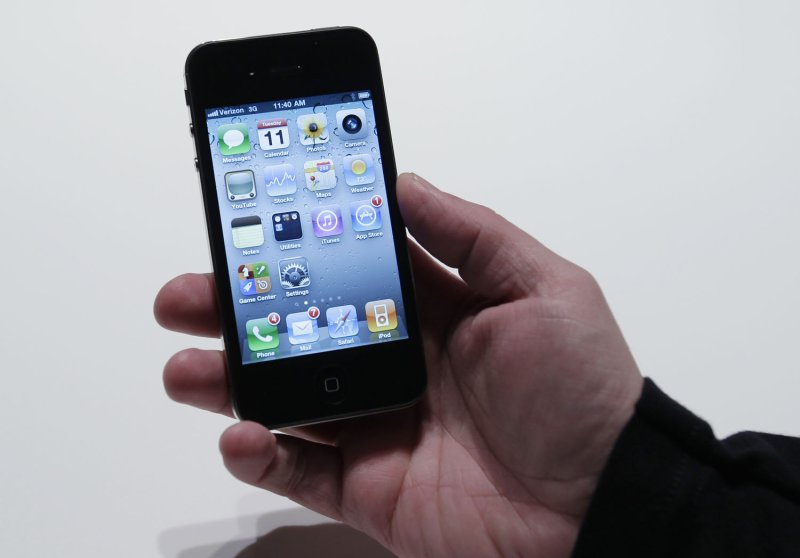The new Verizon Wireless version of the iphone is on display for members of the media to view and touch at Verizon's iPhone 4 launch event in New York January 11, 2011. UPI/John Angelillo |
License Photo
BALTIMORE, Feb. 23 (UPI) -- Less than an hour of cellphone use can increase brain activity closest to the phone antenna, a U.S. government study published Wednesday indicated.
The National Institutes of Health study did not say if the speeded-up brain activity had any effect on a person's health, good or bad, the study published in the Journal of the American Medical Association found.
But it showed the brain is sensitive to cellphones' electromagnetic radiation, said National Institute on Drug Abuse Director Nora Volkow, who led the study.
Her research is the first big study to document the weak radio-frequency signals from cellphones can alter brain activity.
It showed a 7 percent increase in activity in the part of the brain closest to the antenna, findings the researchers said were statistically significant.
"For the time being, the best bet is to use an ear piece or the speaker phone, "particularly in children and adolescents whose brains are much more vulnerable" to radiation than those of adults, ScoutNews's HealthDay quoted Volkow as saying.
Or you could follow the example of kids and teenagers and use text messaging, so the phone is nowhere near your head, she said.
A concern is that cellphone radiation could cause DNA to mutate or alter brain chemicals, leading to tumors or cognitive decline.
But most evidence indicates cellphone radiation isn't strong enough to cause such changes, U.S. medical groups such as the American Cancer Society and government agencies such as the National Cancer Institute and the U.S. Food and Drug Administration, responsible for protecting and promoting public health, say.
The World Health Organization, a United Nations agency, found last year no increased risk of rare brain tumors among European cellphone users.
San Francisco voted in June to require cellphone retailers to post the amount of radiation emitted by each phone. Burlingame, Calif., and Oregon are considering similar rules, The Washington Post reported.
More than 290 million people in the United States are estimated to use cellphones, the Post said.
Volkow's researchers scanned the brains of 47 participants to measure brain activity with a cellphone off and then on.
The people in the randomized 2009 study had cellphones held to their left and right ears for 50 minutes on two different days. The first day neither cellphone was on. The second day the right phone was turned on but muted so the participants wouldn't hear any noise.
This avoided auditory stimulation and prevented any skewing of results because the participants didn't know which phone was active, the researchers said.
University of Washington bioengineering Professor Henry Lai, who studies the biological effects of non-ionizing radiation such as that from cellphones and has long raised concerns about cellphone safety, said in an editorial accompanying the Journal article the study raised questions that were potentially worrisome.
For instance, the changed brain activity could have come from shifts in brain chemicals that also play crucial roles elsewhere in the body, he said. This could mean changes brought about by cellphone use could have unpredictable health effects far from the brain, he said.
He also wondered if regular cellphone use could lead to chronic brain stimulation, which could produce effects no one knows about yet.
"The bottom line is that (the research) adds to the concern that cellphone use could be a health hazard," he said.















